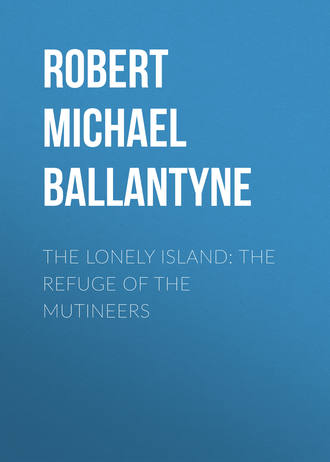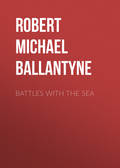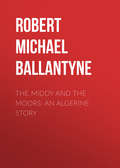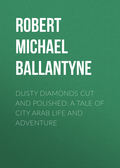
Robert Michael Ballantyne
The Lonely Island: The Refuge of the Mutineers
Chapter Thirteen
Tyrants and Plotters
Leaving Christian and Adams to carry out their philanthropic intentions, we return to Matthew Quintal, whom we left sprawling on the ground in his garden.
This garden was situated in one of the little valleys not far from Bounty Bay. Higher up in the same valley stood the hut of McCoy. Towards this hut Quintal, after gathering himself up, wended his way in a state of unenviable sulkiness.
His friend McCoy was engaged at the time in smoking his evening pipe, but that pipe did not now seem to render him much comfort, for he growled and puffed in a way that showed he was not soothed by it, the reason being that there was no tobacco in the pipe. That weed,—which many people deem so needful and so precious that one sometimes wonders how the world managed to exist before Sir Walter Raleigh put it to its unnatural use—had at last been exhausted on Pitcairn Island, and the mutineers had to learn to do without it. Some of them said they didn’t care, and submitted with a good grace to the inevitable. Others growled and swore and fretted, saying that they knew they couldn’t live without it. To their astonishment, and no doubt to their disgust, they did manage to live quite as healthily as before, and with obvious advantage to health and teeth. Two there were, however, namely, Quintal and McCoy, who would not give in, but vowed with their usual violence of language that they would smoke seaweed rather than want their pipes. Like most men of powerful tongue and weak will, they did not fulfil their vows. Seaweed was left to the gulls, but they tried almost every leaf and flower on the island without success. Then they scraped and dried various kinds of bark, and smoked that. Then they tried the fibrous husk of the cocoa-nut, and then the dried and pounded kernel, but all in vain. Smoke, indeed, they produced in huge volumes, but of satisfaction they had none. It was a sad case.
“If we could only taste the flavour o’ baccy ever so mild,” they were wont to say to their comrades, “the craving would be satisfied.”
To which Isaac Martin, who had no mercy on them, would reply, “If ye hadn’t created the cravin’ boys, ye wouldn’t have bin growlin’ and hankerin’ after satisfaction.”
As we have said, McCoy was smoking, perhaps we should say agonising, over his evening pipe. His man, or slave, Timoa, was seated on the opposite side of the hut, playing an accompaniment on the flute to McCoy’s wife and two other native women, who were singing. The flute was one of those rough-and-ready yellow things, like the leg of a chair, which might serve equally well as a policeman’s baton or a musical instrument. It had been given by one of the sailors to Timoa, who developed a wonderful capacity for drawing unmusical sounds out of it. The singing was now low and plaintive, anon loud and harsh—always wild, like the song of the savages. The two combined assisted the pipe in soothing William McCoy—at least so we may assume, because he had commanded the music, and lay in his bunk in the attitude of one enjoying it. He sometimes even added to the harmony by uttering a bass growl at the pipe.
During a brief pause in the accompaniment Timoa became aware of a low hiss outside, as if of a serpent. With glistening eyes and head turned to one side he listened intently. The hiss was repeated, and Timoa became aware that one of his kinsmen wished to speak with him in secret. He did not dare, however, to move.
McCoy was so much taken up with his pipe that he failed to notice the hiss, but he observed the stoppage of the flute’s wail.
“Why don’t you go on, you brute!” he cried, angrily, at the same time throwing one of his shoes at the musician, which hit him on the shin and caused him a moment’s sharp pain.
Timoa would not suffer his countenance to betray his feelings. He merely raised the flute to his lips, exchanged a glance with the women, and continued his dismal strain. His mind, however, was so engrossed with his comrade outside that the harmony became worse than ever. Even McCoy, who professed himself to be no judge of music, could not stand it, and he was contemplating the application of the other shoe, when a step was heard outside. Next moment his friend Quintal strode in and sat down on a stool beside the door.
“Oh, I say, Matt,” cried McCoy, “who put that cocoa-nut on the bridge of your nose?”
“Who?” grow led Quintal, with an oath. “Who on the island would dare to do it but that domineerin’ upstart, Christian?”
“Humph!” answered McCoy, with a slight sneer. He followed this up with a curse on domineerers in general, and on Fletcher Christian in particular.
It is right to observe here that though we have spoken of these two men as friends, it must not be understood that they were friendly. They had no personal regard for each other, and no tastes in common, save the taste for tobacco and drink; but finding that they disliked each other less than they disliked their comrades, they were thus drawn into a hollow friendship, as it were, under protest.
“How did it happen?” asked McCoy.
“Give us a whiff an’ I’ll tell ’ee. What sort o’ stuff are you tryin’ now?”
“Cocoa-nut chips ground small. The best o’ baccy, Matt, for lunatics, which we was when we cast anchor on this island. Here, fill your pipe an’ fire away. You won’t notice the difference if you don’t think about it. My! what a cropper you must have come down when you got that dab on your proboscis!”
“Stop your howlin’,” shouted Quintal to the musicians, in order to vent some of the spleen which his friend’s remark had stirred up.
Timoa, not feeling sure whether the command was meant for the women or himself, or, perhaps, regarding McCoy as the proper authority from whom such an order should come, continued his dismal blowing.
Quintal could not stand this in his roused condition. Leaping up, he sprang towards Timoa, snatched the flute from his hand, broke it over his head, and kicked him out of the hut.
Excepting the blow and the kick, this was just what the Otaheitan wanted. He ran straight into the bush, which was by that time growing dark under the shades of evening, and found Nehow leaning against a tree and groaning heavily, though in a suppressed tone.
“Quick, come with me to the spring and wash my back,” he cried, starting up.
They did not converse in broken English now, of course, but in their native tongue.
“What has happened?” asked Timoa, anxiously.
While Nehow explained the nature of the cruel treatment he had just received, they ran together to the nearest water-course. It chanced to be pretty full at the time, heavy rain having fallen the day before.
“There; oh! ha–a! not so hard,” groaned the unfortunate man, as his friend laved the water on his lacerated back.
In a few minutes the salt was washed out of the wounds, and Nehow began to feel easier.
“Where is Menalee?” he asked, abruptly, as he sat down under the deep shadow of a banyan-tree.
“In his master’s hut, I suppose,” answered Timoa. “Go find him and Tetaheite; fetch them both here,” he said, with an expression of ferocity on his dark face.
Timoa looked at him with an intelligent grin.
“The white men must die,” he said.
“Yes,” Nehow replied, “the white men shall die.”
Timoa pointed to the lump which had been raised on his shin, grinned again, and turning quickly round, glided into the underwood like an evil spirit of the night.
At that time Menalee was engaged in some menial work in the hut of John Mills. Managing to attract his attention, Timoa sent him into the woods to join Nehow.
When Timoa crept forward, Tetaheite was standing near to a large bush, watching with intense interest the ongoings of Christian, Adams, and Young. These three, in pursuance of the philanthropic principle which had begun to operate, were playing an uproarious game with the children round a huge bonfire; but there was no “method in their madness;” the children, excepting Thursday October Christian and Sally, were still too young for concerted play. They were still staggerers, and the game was simply one of romps.
Tetaheite’s good-humoured visage was glistening in the firelight, the mouth expanded from ear to ear, and the eyes almost closed.
Suddenly he became aware of a low hissing sound. The mouth closed, and the eyes opened so abruptly, that there seemed some necessary connection between the two acts. Moving quietly round the bush until he got into its shadow, his dark form melted from the scene without any one observing his disappearance.
Soon the four conspirators were seated in a dark group under shade of the trees.
“The time has come when the black man must be revenged,” said Nehow. “Look my back. Salt was rubbed into these wounds. It is not the first time. It shall be the last! Some of you have suffered in the same way.”
It scarcely needed this remark to call forth looks of deadly hate on the Otaheitan faces around him.
“The white men must die,” he continued. “They have no mercy. We will show none.”
Even in the darkness of that secluded spot the glistening of the eyes of these ill-treated men might have been seen as they gave ready assent to this proposal in low guttural tones.
“How is it to be done?” asked Menalee, after a short pause.
“That is what we have met to talk about,” returned Nehow. “I would hear what my brothers have to say. When they have spoken I will open my mouth.”
The group now drew closer together, and speaking in still lower tones, as if they feared that the very bushes might overhear and betray them, they secretly plotted the murder of the mutineers.
Chapter Fourteen
The Influence of Infancy, also of Villainy
While the dark plots referred to in the last chapter were being hatched, another life was introduced into the little community in the form of a third child to Fletcher Christian,—a little girl. Much though this man loved his two boys, a tenderer, though not, perhaps, a deeper region of his heart was touched by his daughter. He at once named her Mary. Who can tell the multitude of old memories and affections which were revived by this name? Might it not have been that a mother, a sister, some lost though not forgotten one, came forcibly to mind, and accounted, in some degree at least, for the wealth of affection which he lavished on the infant from the day of her birth? We cannot tell, but certain it is that there never was a more devoted father than this man, who in England had been branded with all that was ferocious, mean, desperate,—this hardened outlaw, this chief of the mutineers.
Otaheitan mothers are not particular in the matter of infant costume. Little Mary’s dress may be described in one word—nothing. Neither are such mothers much troubled with maternal anxieties. Long before a European baby would have been let out of the hands of mother or nurse, even for a moment, little Molly Christian was committed to the care of her delighted father, who daily bore her off to a favourite resort among the cliffs, and there played with her.
One day, on reaching his place of retirement, he was surprised to find a man in possession before him. Drawing nearer, he observed that the man also had a baby in his arms.
“Why, I declare, it’s Edward Young!” he exclaimed, on going up.
“Of course it is,” said the midshipman, smiling, as he held his own little daughter Jane aloft. “Do you think you are to have it all to yourself? And do you imagine that yours is the only baby in the world worth looking at?”
“You are right, Young,” returned Christian, with the nearest approach to a laugh he had made for years. “Come now,” he added, sitting down on a rock, and placing little Moll tenderly in the hollow of his left arm, so as to make her face his friend, “let’s set them up, and compare notes; isn’t she a beauty?”
“No doubt of it whatever; and isn’t mine ditto?” asked the midshipman, sitting down, and placing little Poll in a similar position on his right arm.
“But, I say, if you and I are to get on amicably, we mustn’t praise our own babies. Let it be an agreement that you praise my Poll, and I’ll praise your Moll. Don’t they make lovely pendants! Come, let us change them for a bit.”
Christian agreeing to this, the infants were exchanged, and thereupon these two fathers lay down on the soft grass, and perpetrated practical jokes upon, and talked as much ineffable nonsense to, those two whitey-brown balls, as if they had been splendid specimens of orthodox pink and white. It was observed, however, by the more sagacious of the wondering gulls that circled round them, that a state of perfect satisfaction was not attained until the babies were again exchanged, and each father had become exclusively engrossed with his own particular ball.
“Now, I say, Fletcher,” remarked Young, rising, and placing himself nearer his friend, “it’s all very well for you and me to waste our time and make fools of ourselves here; but I didn’t merely come to show off my Polly. I came to ask what you think of that rumour we heard last night, that there has been some sort of plotting going on among the Otaheitan men.”
“I don’t think anything of it at all,” replied Christian, whose countenance at once assumed that look of gravity which had become habitual to him since the day of the mutiny. “They have had too good reason to plot, poor fellows, but I have such faith in their native amiability of disposition, that I don’t believe they will ever think of anything beyond a brief show of rebellion.”
“I also have had faith in their amiability,” rejoined Young; “but some of us, I fear, have tried them too severely. I don’t like the looks they sometimes give us now. We did wrong at the first in treating them as servants.”
“No doubt we did, but it would have been difficult to do otherwise,” said Christian; “they fell so naturally into the position of servants of their own accord, regarding us, as they did, as superior beings. We should have considered their interests when we divided the land, no doubt. However, that can’t well be remedied now.”
“Perhaps not,” remarked Young, in an absent tone. “It would be well, however, to take some precautions.”
“Come, we can discuss this matter as we go home,” said Christian, rising. “I have to work in my yam-plot to-day, and must deliver Molly to her mother.”
They both rose and descended the slope that led to the village, chatting as they went.
Now, although the native men were of one mind as to the slaying of the Englishmen, they seemed to have some difference of opinion as to the best method of putting their bloody design in execution. Menalee, especially, had many objections to make to the various proposals of his countrymen. In fact, this wily savage was deceitful. Like Quintal and McCoy among the whites, he was among the blacks a bad specimen of humanity.
The consequence was that Timoa and Nehow, being resolved to submit no longer to the harsh treatment they had hitherto received, ran away from their persecutors, and took refuge in the bush.
To those who have travelled much about this world, it may sound absurd to talk of hiding away in an island of such small size; but it must be borne in mind that the miniature valleys and hills of the interior were, in many places, very rugged and densely clothed with jungle, so that it was, in reality, about as difficult to catch an agile native among them as to catch a rabbit in a whin-field.
Moreover, the two desperate men carried off two muskets and ammunition, so that it was certain to be a work of danger to attempt their recapture. In these circumstances, Christian and Young thought it best to leave them alone for a time.
“You may be sure,” said the former, as they joined their comrades, “that they’ll soon tire of rambling, especially when their ammunition is spent.”
Quintal, who stood with all the other men by the forge watching John Williams as he wrought at a piece of red-hot iron, and overheard the remark, did not, he said, feel so sure of that. Them niggers was fond o’ their liberty, and it was his opinion they should get up a grand hunt, and shoot ’em down off-hand. There would be no peace till that was done.
“There would be no peace even after that was done,” said Isaac Martin, with a leer, “unless we shot you along wi’ them.”
“It’s impossible either to shoot or drown Matt Quintal, for he’s born to be hanged,” said McCoy, sucking viciously at his cocoa-nut-loaded pipe, which did not seem to draw well.
“That’s true,” cried Mills, with a laugh, in which all the party except Christian joined more or less sarcastically according to humour.
“Oh, mother,” exclaimed Otaheitan Sally, going into her hut on tiptoe a few minutes later, with her great eyes dilated in horror, “the white mens is talkin’ of shootin’ Timoa and Nehow!”
“Never mind, dear,” replied her mother in her own language, “it’s only talk. They’ll never do such a thing. I’m sure Mr Young did not agree to help in such a deed, did he?”
“O no, mother,” answered Sally, with tremendous emphasis; “he said it would be very very, wicked to do such tings.”
“So it would, dear. No fear. It’s only talk.”
Satisfied with this assurance, Sally went off with a cleared visage to superintend some operation in connection with her ever-increasing infantry charge, probably to pay some special attention to her favourite Charlie, or to chaff “that booby” Thursday October, though, to say truth, Thursday was no booby, but a smart intelligent fellow.
The very next day after that, Timoa and Nehow came down to Edward Young as he was at work alone in his yam-field. This field was at a considerable distance from the settlement, high up on the mountain-side. The two men had left their weapons behind them.
“We’s comed for give you a helpin’ hand, Missr Yong, if you no lay hands on us,” said Nehow.
“I have no wish to lay hands on you,” replied Young; “besides, I have no right to do so. You know I never regarded you as slaves, nor did I approve of your bad treatment. But let me advise you to rejoin us peaceably, and I promise to do what I can to make things go easier.”
“Nebber!” exclaimed Nehow, fiercely.
“Well, it will be the worse for yourselves in the long-run,” said Young, “for Quintal and McCoy will be sure to go after you at last and shoot you.”
The two men looked at each other when he said that, and smiled intelligently.
“However, if you choose to help me now,” continued Young, “I’ll be obliged to you, and will pay you for what you do.”
The men set to work with a will, for they were fond of the kindly midshipman; but they kept a bright look-out all the time, lest any of the other Englishmen should come up and find them there.
For two or three evenings in succession Timoa and Nehow came to Young’s field and acted in this way. Young made no secret of the fact, and Quintal, on hearing of it, at once suggested that he and McCoy should go up and lie in ambush for them.
“If you do,” said Young, with indignation, “I’ll shoot you both. I don’t jest. You may depend on it, if I find either of you fellows skulking near my field when these men are at work there, your lives won’t be worth a sixpence.”
At this Quintal and McCoy both laughed, and said they were jesting. Nevertheless, while walking home together after that conversation, they planned the carrying out of their murderous intention.
Thus, with plot and counterplot, did the mutineers and Otaheitans render their lives wretched. What with the bitter enmity existing between the whites and blacks, and the mutual jealousies among themselves, both parties were kept in a state of perpetual anxiety, and the beautiful isle, which was fitted by its Maker to become a paradise, was turned into a place of torment.
Sometimes the other native men, Tetaheite and Menalee, joined Nehow and Timoa in working in Young’s garden, and afterwards went with them into the bush, where they planned the attack which was afterwards made.
At last the lowering cloud was fully charged, and the thunderbolt fell.
Chapter Fifteen
Murder!
The planting time came round at Pitcairn, and all was busy activity in the little settlement at Bounty Bay. The women, engaged in household work and in the preparation of food, scarcely troubled themselves to cast an anxious eye on the numerous children who, according to age and capacity, rolled, tumbled, staggered, and jumped about in noisy play. The sun, streaming through the leaves of the woods, studded shady places with balls of quivering light, and blazed in fierce heat in the open where the men were at work, each in his respective garden. We have said that those gardens lay apart, at some distance from each other, and were partially concealed by shrubs or undulating knolls.
The garden of John Williams was farthest off from the settlement. He wrought in it alone on the day of which we write. Next to it was that of Fletcher Christian. He also worked alone that day.
About two hundred yards from his garden, and screened from it by a wooded rising ground, was a piece of plantation, in which John Mills, William McCoy, and Menalee were at work together. John Adams, William Brown, and Isaac Martin were working in their own gardens near their respective houses, and Quintal was resting in his hut. So was Edward Young, who, having been at work since early morning, had lain down and fallen into a deep slumber.
The three native men, Timoa, Nehow, and Tetaheite, were still away in the woods. If the unfortunate Englishmen had known what these men were about, they would not have toiled so quietly on that peaceful morning!
The Otaheitans met in a cocoa-nut grove at some distance to the eastward of the settlement. Each had a musket, which he loaded with ball. They did not speak much, and what they did say was uttered in a suppressed tone of voice.
“Come,” said Timoa, leading the way through the woods.
The others followed in single file, until they reached the garden where Williams was at work. Here their movements were more cautious. As they advanced, they crept along on their knees with the motion of cats, and with as little noise. They could hear the sound of the armourer’s spade, as he turned up the soil. Presently they came to an opening in the bushes, through which they could see him, not thirty yards off.
Timoa drew himself together, and in a crouching attitude levelled his musket.
During their absence in the woods, these men had practised shooting at a mark, doubtless in preparation for the occasion which had now arrived. The woods and cliffs rang to the loud report, and Williams fell forward without a cry or groan, shot through the heart.
The murderers rose and looked at each other, but uttered not a word, while Timoa recharged his gun.
The report had, of course, been heard by every one in the settlement, but it was a familiar sound, and caused neither surprise nor alarm. McCoy merely raised himself for a moment, remarked to Mills that some one must have taken a fancy for a bit of pork to supper, and then resumed his work.
Christian also heard the shot, but seemed to pay no regard to it. Ceasing his labour in a few minutes, he raised himself, wiped his forehead, and resting both hands on his spade, looked upwards at the bright blue sky. Fleecy clouds passed across it now and then, intensifying its depth, and apparently riveting Christian’s gaze, for he continued motionless for several minutes, with his clear eye fixed on the blue vault, and a sad, wistful expression on his handsome face, as if memory, busy with the past and future, had forgotten the present. It was his last look. A bullet from the bushes struck him at that moment on the breast. Uttering one short, sharp cry, he threw both hands high above his head, and fell backwards. The spasm of pain was but momentary. The sad, wistful look was replaced by a quiet smile. He never knew who had released his spirit from the prison-house of clay, for the eyes remained fixed on the bright blue sky, clear and steadfast, until death descended. Then the light went out, just as his murderers came forward, but the quiet smile remained, and his spirit returned to God who gave it.
It seemed as if the murderers were, for a few moments, awestruck and horrified by what they had done; but they quickly recovered. What they had set their faces to accomplish must now be done at all hazards.
“Did you hear that cry?” said McCoy, raising himself from his work in the neighbouring garden.
“Yes; what then?” demanded Quintal.
“It sounded to me uncommon like the cry of a wounded man,” said McCoy.
“Didn’t sound like that to me,” returned Quintal; “more like Mainmast callin’ her husband to dinner.”
As he spoke, Tetaheite appeared at the edge of the garden with a musket in his hand, the other two natives remaining concealed in the bushes.
“Ho, Missr Mills,” he called out, in his broken English, “me have just shoot a large pig. Will you let Menalee help carry him home?”
“Yes;—you may go,” said Mills, turning to Menalee.
The Otaheitan threw down his tools, and joined his comrades in the bush, where he was at once told what had been done.
Menalee did not at first seem as much pleased as his comrades had expected, nevertheless, he agreed to go with them.
“How shall we kill Mills and McCoy?” asked Timoa, in a low whisper.
“Shoot them,” answered Menalee; “you have three muskets.”
“But they also have muskets,” objected Tetaheite, “and are good shots. If we miss them, some of us shall be dead men at once.”
“I’ll tell you what we’ll do,” said Nehow, who thereupon hastily detailed a plan, which they proceeded at once to carry out.
Creeping round through the woods, they managed to get into McCoy’s house by a back window, unobserved. Menalee then ran down to the garden, as if in a state of great excitement.
“Oh, Missr McCoy, Timoa and Nehow hab come down from mountain, an’ is robbin’ you house!”
The bait took. McCoy ran up to his house. As soon as he reached the door there was a volley from within, but McCoy remained untouched.
Seeing this, and, no doubt, supposing that he must be badly wounded, Menalee, who had followed him, seized him from behind. But McCoy, being the stronger man, twisted himself suddenly round, grasped Menalee by the waist with both hands, and flung him headlong into a neighbouring pig-sty. He then turned and ran back to his garden to warn Mills.
“Run for it, Mills,” he cried; “run and take to the bush. All the black scoundrels have united to murder us.”
He set the example by at once disappearing in the thick bush. But Mills did not believe him. He and Menalee had always been good friends, and he seemed to think it impossible that they would kill him. He hesitated, and the hesitation cost him his life, for next moment a bullet laid him low.
Meanwhile McCoy ran to warn Christian. Reaching his garden, he found him there, dead, with the tranquil smile still on his cold lips, and the now glazed eyes still gazing upwards. One glance sufficed. He turned and ran back to Christian’s house to tell his wife what he had seen, but the poor woman was sick in bed at the time and could not move. Running then to Quintal’s garden, he found him alive, but quite ignorant of what was going on.
“They seem to be wastin’ a deal of powder to-day,” he growled, without raising himself, as McCoy came up; “but—hallo! you’re blowing hard. What’s wrong?”
As soon as he heard the terrible story he ran to his wife, who chanced to be sitting near the edge of his garden.
“Up, old girl,” he cried, “your nigger countrymen are murderin’ us all. If you want to see any of us escape you’d better go and warn ’em. I shall look after number one.”
Accordingly, with his friend of kindred spirit, he sought refuge in the bush.
Mrs Quintal had no desire to see all the white men slaughtered by her countrymen. She therefore started off at once, and in passing the garden of John Adams, called to him to take to the bush without delay, and ran on.
Unfortunately Adams did not understand what she meant. He, like the others, had heard the firing, but had only thought of it as a foolish waste of ammunition. Nothing was further from his thoughts on that peaceful day and hour than deeds of violence and bloodshed. He therefore continued at work.
The four murderers, meanwhile, ran down to Isaac Martin’s house, found him in the garden, and pointing their muskets at him, pulled the triggers. The pieces missed fire, and poor Martin, thinking probably that it was a practical joke, laughed at them. They cocked again, however, and fired. Martin, although he fell mortally wounded, had strength to rise again and fly towards his house. The natives followed him into it. There was one of the sledge-hammers of the Bounty there. One of them seized it, and with one blow beat in the poor man’s skull.
Roused, apparently, to madness by their bloody work, the Otaheitans now rushed in a body to Brown’s garden. The botanist had been somewhat surprised at the frequent firing, but like his unfortunate fellow-countrymen, appeared to have not the remotest suspicion of what was going on. The sight of the natives, however, quickly opened his eyes. He turned as if to fly, but before he could gain the bushes, a well-aimed volley killed him.
Thus in little more than an hour were five of the Englishmen murdered.
It now seemed as if the revenge of the Otaheitans had been sated, for after the last tragic act they remained for some time in front of Brown’s house talking, and resting their hands on the muzzles of their guns.
All this time Edward Young was lying asleep in ignorance of what was being done, and purposely kept in ignorance by the women. Having been told by Quintal’s wife, they knew part of the terrible details of the massacre, but they had no power to check the murderers. They, however, adopted what means they could to shield Young, who, as we have said, was a favourite with all the natives, and closed the door of the hut in which he lay to prevent his being awakened.
The suspicions of Adams having at length been aroused, he went down to Brown’s house to see what all the firing could be about. The children, meanwhile, having some vague fears that danger threatened, had run into their mother’s huts. Everything passed so quickly, in fact, that few of the people had time to understand or think, or take action in any way.







